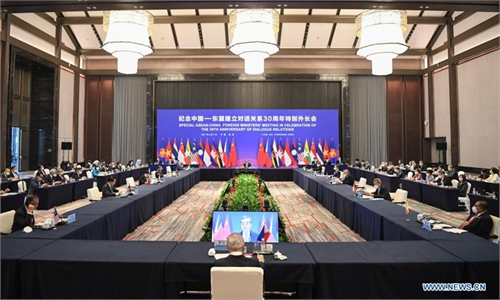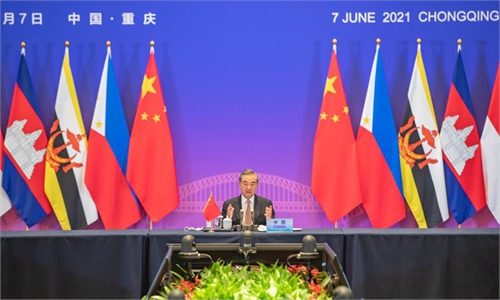
Illustration: Liu Rui/GT
In a Thursday report entitled "China and Southeast Asian countries pledge greater vaccine cooperation as US influence wanes," the Australian Broadcasting Corporation (ABC) misinterpreted the Special ASEAN-China Foreign Ministers' Meeting held in China's Chongqing as a demonstration of ASEAN's "reliance on China-made vaccines."
However, the real reason ASEAN foreign ministers attended such a meeting was not because of the decline of US influence but because of China's sincerity in developing relations with them and helping them.
In late May, US Secretary of State Antony Blinken tried to have a virtual meeting with his ASEAN counterparts - supposed to be the Biden administration's first high-level meeting with the regional bloc. But Blinken kept the top diplomats from Southeast Asia waiting 45 minutes before blank screens, according to reports by the ABC and the Asia Times.
"The technical snafu during Blinken's meeting with ASEAN leaders reinforced the sentiment of South-East Asia being neglected by the US that has been brewing for a while," the ABC quoted Ivy Kwek, a Malaysian analyst, as saying.
China has kept sustained communications with its Southeast Asian partners. As Chinese Foreign Ministry spokesperson Wang Wenbin said on Monday, "China-ASEAN cooperation has grown by leaps and bounds, becoming the most successful and dynamic example of cooperation in the Asia-Pacific region."
In cooperation on the COVID-19 fight, for example, as of May, the Philippines has received more than 5 million doses of Chinese vaccines, and Thailand has received 6 million doses from China.
The Trump administration cold-shouldered ASEAN. Although the Biden administration vows to value more its allies and partners, it attaches importance to ASEAN for the sake of the US' own interests while acting arrogantly over the bloc.
The US has seen ASEAN members as its vassals, wishfully believing that without the help of Washington, ASEAN countries would be bullied by China. But this goes drastically against the facts. "The US sees itself as a savior to ASEAN. This is ill mentality. But it is hard to change, as the US has always defined itself in such a way," Li Haidong, a professor at the Institute of International Relations of the China Foreign Affairs University, told the Global Times on Thursday.
The US attaches importance to its alliance system because it needs to rely on allies and partners to gain an upper hand in geopolitical and strategic competition with China. The essence of US valuing allies is to make them serve Washington's geopolitical interests.
Such being the case, the US' layout in the Asia-Pacific region is hierarchical: Washington comes first, then its allies such as Quad members and South Korea, then ASEAN, Li said. No matter what the US has said or promised, what it has been doing has clearly revealed its partiality.
According to the Asia Times, in its first two months in power, the Biden administration held multiple high-level engagements with allies in Europe as well as with major Indo-Pacific powers - India, Australia, Japan and, later, South Korea. But it didn't even bother to mention its century-old Southeast Asian treaty allies - the Philippines and Thailand - in its Interim National Security Strategic Guidance, which was released on March 3; nor did Biden show any urgency in calling up his Southeast Asian partners.
There is a growing sense among regional countries that the US is intent on building an "Asian NATO" with like-minded powers, even if this comes at the expense of ASEAN centrality in shaping the region's security architecture, the Asia Times reported on June 1.
What ASEAN has been through in its relations with the US is like a mirror reflecting Washington's arrogance and selfishness.
"The US is good at sacrificing its allies for its own interests. But never vice versa. ASEAN is actually aware of the US' intentions, and is becoming more vigilant toward what the US is up to. This is the reality," Li noted.



